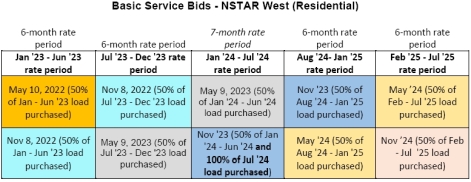|
|
|
|
|
Regulator Orders Changes In Fixed Price Periods Under Default Service
The following story is brought free of charge to readers by VertexOne, the exclusive EDI provider of EnergyChoiceMatters.com
The Massachusetts DPU ordered the electric distribution utilities to separate January and February into separate basic service pricing periods, such that January and February will no longer be in the same fixed retail rate price period, with a change made for both mass market and large customers
The new basic service fixed price periods, for mass market customers, will be February through July, and August though January. For large customers, January and February will be separated as well, but the fixed price periods will be three months, consistent with the current length of fixed pricing for large C&Is (the large C&I periods will start with February through April and proceed so forth in three month intervals)
Currently, Nstar (all territories) and National Grid have, for mass market customers, fixed six-month basic service price periods in which January and February are within the same price period. Unitil has already begun a transition to having January and February be in separate periods.
The DPU approved Nstar's proposed approach to transition to the new pricing periods (a transition is required due to already completed procurements for a portion of basic service)
Nstar had provided the following illustrative example of its transition (using residential service in the West territory as an example), and the DPU endorsed this approach:
The DPU approved National Grid’s Option 1
transition rate plan. After the transition plan is completed, National Grid’s procurements would follow a repeating
schedule every June and December
National Grid's approved transition plan in summarized in the following chart and further explained below
The first procurement under this transition plan would occur in September of 2023. In
this RFP, National Grid would deviate from twelve-month procurements for 50 percent of the
basic service supply. National Grid would have a typical six-month transaction for 50 percent of
the basic service supply from November 2023 through April 2024. However, the next
transaction will be for 100 percent of basic service supply for only three-months: May, June, and
July 2024.
National Grid intends to file a nine-month basic service rate for its Residential and
Commercial Customer Classes for November 2023 through July 2024.
The second procurement of the First Transition Plan would occur in December 2023.
Instead of a typical twelve-month procurement for 50 percent of basic service supply, the
Company would have a six-month procurement for 50 percent of basic service supply. After this
procurement, National Grid will have transitioned to the Department’s proposed pricing period
for August 2024 through January 2025.
After the second procurement of the First Transition Plan, National Grid would begin its
recurring schedule of twelve-month procurements for 50 percent of basic service supply every
June and December. In June 2024, National Grid would procure 50 percent of the basic service
supply for August 2024 through July 2025, at which point it would file basic service rates for
August 2024 through January 2025 for the Residential and Commercial Customer Classes. In
December 2024, National Grid would procure 50 percent of the basic service supply for February
2025 through January 2026, and this schedule would continue to repeat.
The DPU said that concerns from power marketers, who said that separating January and February into separate periods would increase rates, were not supported
The NRG Retail Companies had asserted that the proposed rate schedule change would move in the
opposite direction of sending basic service customers a price signal that indicates the region’s
reliance on natural gas and oil during the winter
In response, the DPU said, "The Department appreciates NRG Retail Companies’ concern and intends to investigate
structural changes to basic service that includes time-varying rates in a future investigation."
As for now, the DPU said the adopted change balances rate stability and market price signals consistent with past DPU actions
D.P.U. 23-50
ADVERTISEMENT ADVERTISEMENT Copyright 2010-23 Energy Choice Matters. If you wish to share this story, please
email or post the website link; unauthorized copying, retransmission, or republication
prohibited.
September 1, 2023
Email This Story
Copyright 2010-23 EnergyChoiceMatters.com
Reporting by Paul Ring • ring@energychoicematters.com



NEW Jobs on RetailEnergyJobs.com:
• NEW! -- Business Development Manager -- Retail Supplier
• NEW! -- Call Center Manager -- Retail Supplier
• Senior Billing Subject Matter - (Remote) -- Retail Supplier
|
|
|
|







